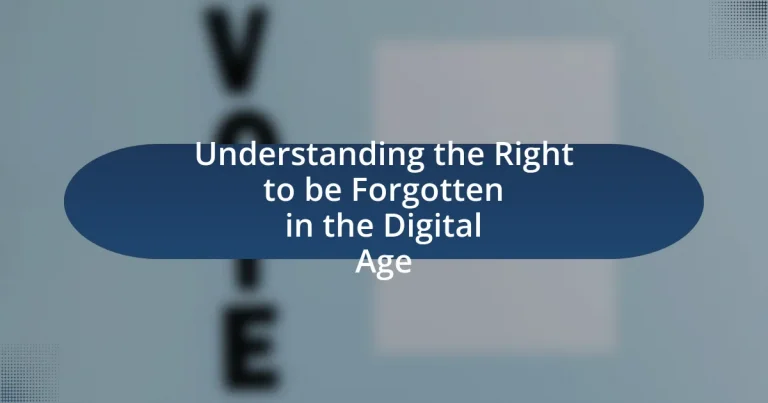The Right to be Forgotten is a legal principle that allows individuals to request the removal of personal information from online platforms and search engines under specific conditions, primarily established by the European Court of Justice in 2014. This article explores the origins of this right, its supporting legal frameworks such as the General Data Protection Regulation (GDPR), and its evolution across different jurisdictions. It also examines the implications for personal privacy and freedom of expression, the challenges in enforcement, and the role of technology and businesses in navigating this right. Additionally, the article outlines best practices for individuals seeking to exercise their rights and the resources available for assistance in the process.

What is the Right to be Forgotten?
The Right to be Forgotten is a legal concept that allows individuals to request the removal of personal information from search engines and online platforms under certain conditions. This right was established by the European Court of Justice in 2014, which ruled that individuals have the right to request the deletion of links to personal data that is outdated, irrelevant, or excessive. The ruling emphasizes the balance between privacy rights and the public’s right to access information, particularly in the context of digital data that can persist indefinitely.
How did the Right to be Forgotten originate?
The Right to be Forgotten originated from a 2014 ruling by the Court of Justice of the European Union (CJEU), which established that individuals have the right to request the removal of personal information from search engine results under certain conditions. This landmark decision was based on the interpretation of the European Union’s Data Protection Directive, emphasizing the balance between privacy rights and the public’s right to access information. The ruling was prompted by a case involving a Spanish citizen, Mario Costeja González, who sought the removal of links to outdated information about his financial troubles, highlighting the need for individuals to control their digital footprint.
What legal frameworks support the Right to be Forgotten?
The legal frameworks that support the Right to be Forgotten primarily include the General Data Protection Regulation (GDPR) in the European Union and various national laws that align with its principles. The GDPR, enacted in May 2018, grants individuals the right to request the deletion of personal data under certain conditions, such as when the data is no longer necessary for the purposes for which it was collected or when the individual withdraws consent. Additionally, the Court of Justice of the European Union (CJEU) has reinforced this right through landmark rulings, such as the 2014 Google Spain case, which established that search engines must remove links to personal information upon request if it is deemed inadequate, irrelevant, or excessive. These legal frameworks collectively provide a robust foundation for individuals seeking to exercise their Right to be Forgotten in the digital landscape.
How has the concept evolved over time?
The concept of the Right to be Forgotten has evolved significantly since its inception. Initially recognized in European Union law through the 2014 Court of Justice of the European Union ruling, which established that individuals could request the removal of personal data from search engine results under certain conditions, the concept has expanded globally. As digital privacy concerns have grown, various jurisdictions have begun to adopt similar principles, reflecting a shift towards prioritizing individual privacy rights in the face of increasing data proliferation. For instance, countries like Brazil and California have enacted laws that incorporate elements of the Right to be Forgotten, demonstrating its influence beyond Europe. This evolution highlights a broader societal recognition of the need for individuals to control their digital footprints in an age where information is easily accessible and often permanent.
Why is the Right to be Forgotten important in the digital age?
The Right to be Forgotten is important in the digital age because it empowers individuals to control their personal information online. This right allows people to request the removal of outdated or irrelevant data from search engines and websites, thereby protecting their privacy and reputation. For instance, a study by the European Data Protection Supervisor in 2018 highlighted that 60% of individuals felt that their online presence negatively impacted their personal and professional lives. By enabling the deletion of such information, the Right to be Forgotten fosters a safer digital environment, promoting dignity and autonomy in an era where personal data is easily accessible and often misused.
What implications does it have for personal privacy?
The right to be forgotten significantly impacts personal privacy by allowing individuals to request the removal of their personal data from online platforms. This legal framework empowers users to control their digital footprint, thereby enhancing their privacy rights. For instance, the European Union’s General Data Protection Regulation (GDPR) grants individuals the right to request deletion of their data when it is no longer necessary for the purposes for which it was collected. This regulation illustrates how the right to be forgotten can lead to greater personal privacy by reducing the amount of personal information available online, thus minimizing the risk of misuse or unauthorized access.
How does it affect freedom of expression?
The Right to be Forgotten can significantly limit freedom of expression by allowing individuals to request the removal of certain online information. This legal framework can lead to censorship, as it may restrict access to information that is deemed relevant for public discourse or historical context. For instance, in the European Union, the General Data Protection Regulation (GDPR) enables individuals to have personal data erased, which can conflict with journalistic freedom and the public’s right to know, as seen in cases where news articles are removed at the request of individuals.
Who can invoke the Right to be Forgotten?
Individuals can invoke the Right to be Forgotten. This legal right allows individuals to request the removal of personal information from search engine results and online platforms under certain conditions, particularly when the information is outdated, irrelevant, or harmful. The European Union’s General Data Protection Regulation (GDPR) provides the framework for this right, enabling individuals to seek the deletion of their data to protect their privacy and reputation.
What criteria must individuals meet to request removal of information?
Individuals must demonstrate that the information in question is inaccurate, irrelevant, excessive, or outdated to request its removal. This aligns with the principles established by the General Data Protection Regulation (GDPR), which allows individuals to seek deletion of personal data under specific circumstances. For instance, if the data no longer serves its original purpose or if the individual withdraws consent for processing, they can initiate a removal request.
How do different jurisdictions handle requests?
Different jurisdictions handle requests for the right to be forgotten in varied ways, reflecting their legal frameworks and cultural attitudes towards privacy. For instance, the European Union mandates that individuals can request the removal of personal data under the General Data Protection Regulation (GDPR), which requires organizations to comply unless they can demonstrate a legitimate reason to retain the data. In contrast, the United States lacks a comprehensive federal law akin to the GDPR, leading to a more fragmented approach where states like California have enacted their own privacy laws, allowing for some degree of data removal but not a universal right to be forgotten. This divergence illustrates how legal interpretations and enforcement mechanisms differ significantly across regions, impacting individuals’ ability to control their personal information online.

What are the challenges associated with the Right to be Forgotten?
The challenges associated with the Right to be Forgotten include balancing individual privacy rights with public interest and freedom of expression. This legal framework often leads to conflicts between the desire to remove personal information from search engines and the need for transparency and accountability in public discourse. For instance, in 2019, the European Court of Justice ruled that search engines must consider the context of the information when evaluating removal requests, complicating the decision-making process. Additionally, the implementation of this right can lead to inconsistent applications across different jurisdictions, as seen in varying interpretations of the law in the European Union compared to the United States. These complexities highlight the ongoing debates surrounding data protection, censorship, and the evolving nature of digital information.
What are the main legal challenges faced?
The main legal challenges faced regarding the Right to be Forgotten include balancing individual privacy rights with freedom of expression and public interest. Courts and regulators often struggle to define the scope of what constitutes sensitive personal data and the criteria for removal from search engines. For instance, the European Court of Justice ruling in Google Spain SL v. Agencia Española de Protección de Datos established that individuals can request the removal of links to personal information under certain conditions, yet this has led to inconsistent applications across member states. Additionally, the lack of clear guidelines on enforcement and the potential for abuse by individuals seeking to erase legitimate information complicate the legal landscape.
How do courts interpret the Right to be Forgotten?
Courts interpret the Right to be Forgotten as a legal principle that allows individuals to request the removal of personal information from search engines and online platforms under certain conditions. This interpretation is primarily guided by the balance between an individual’s right to privacy and the public’s right to access information. For instance, the Court of Justice of the European Union (CJEU) established in the 2014 Google Spain case that individuals can request the delisting of links to personal data that is inadequate, irrelevant, or excessive in relation to the purposes for which it was processed. This ruling emphasizes that the Right to be Forgotten is not absolute and must be weighed against the public interest in accessing information, particularly when it pertains to public figures or matters of public concern.
What conflicts arise with existing laws?
Conflicts arise with existing laws primarily due to the tension between the right to be forgotten and freedom of expression. The right to be forgotten allows individuals to request the removal of personal information from search engines and online platforms, which can conflict with laws protecting free speech and the public’s right to access information. For instance, the European Union’s General Data Protection Regulation (GDPR) supports the right to be forgotten, but this can clash with journalistic rights under the European Convention on Human Rights, which emphasizes the importance of freedom of expression. Additionally, the implementation of the right to be forgotten can lead to inconsistencies in how different jurisdictions handle data removal requests, creating legal ambiguities and challenges for enforcement.
What technological challenges exist in enforcing this right?
Enforcing the right to be forgotten faces several technological challenges, primarily related to data persistence and the complexity of digital ecosystems. The challenge of data persistence arises because information can be replicated across multiple platforms and servers, making it difficult to ensure complete removal from all locations. Additionally, the complexity of digital ecosystems, which includes various stakeholders like search engines, social media platforms, and cloud services, complicates the enforcement process as each entity may have different policies and capabilities regarding data deletion. Furthermore, the lack of standardized protocols for data removal across jurisdictions adds another layer of difficulty, as legal frameworks vary significantly around the world, impacting the effectiveness of enforcement efforts.
How do search engines respond to removal requests?
Search engines respond to removal requests by evaluating the legitimacy of the request based on legal frameworks, such as the General Data Protection Regulation (GDPR) in Europe. When a user submits a removal request, search engines assess whether the content in question violates privacy rights or if it is outdated, irrelevant, or inaccurate. For instance, under GDPR, individuals have the right to request the removal of personal data that is no longer necessary for the purposes for which it was collected. If the request meets these criteria, search engines may remove the links to the content from their search results. This process is supported by guidelines established by regulatory bodies, which outline the conditions under which removal is warranted.
What role do social media platforms play in this context?
Social media platforms play a crucial role in the context of the Right to be Forgotten by serving as primary channels for the dissemination and retention of personal information. These platforms often store vast amounts of user-generated content, which can include sensitive personal data that individuals may wish to remove or restrict access to. For instance, a study by the European Data Protection Supervisor highlights that social media sites can perpetuate the visibility of outdated or harmful information, complicating individuals’ efforts to exercise their rights under data protection laws. This dynamic underscores the need for social media companies to implement effective mechanisms for users to request the removal of their data, aligning with the principles of the Right to be Forgotten established by the European Court of Justice in 2014.
How do businesses navigate the Right to be Forgotten?
Businesses navigate the Right to be Forgotten by implementing data management policies that comply with legal requirements while balancing user privacy and operational needs. They establish clear procedures for individuals to request data deletion, assess the legitimacy of such requests, and ensure compliance with regulations like the General Data Protection Regulation (GDPR). For instance, a study by the European Data Protection Board indicates that organizations must evaluate the relevance and necessity of the data in question before proceeding with deletion, ensuring that they do not infringe on other legal obligations. Additionally, businesses often invest in training staff on data protection laws and utilize technology solutions to streamline the process of managing data requests effectively.
What best practices should companies adopt?
Companies should adopt best practices that prioritize data privacy and compliance with regulations regarding the Right to be Forgotten. Implementing clear data retention policies ensures that personal data is only kept as long as necessary, aligning with legal requirements such as the General Data Protection Regulation (GDPR), which mandates that individuals have the right to request the deletion of their personal data. Regular training for employees on data protection principles and the importance of respecting user privacy fosters a culture of compliance. Additionally, companies should establish transparent processes for handling deletion requests, ensuring that users can easily exercise their rights. These practices not only enhance trust with customers but also mitigate legal risks associated with non-compliance.
How can businesses balance compliance with user rights?
Businesses can balance compliance with user rights by implementing transparent data management practices that adhere to legal frameworks while respecting individual privacy. This involves establishing clear policies for data collection, storage, and deletion that align with regulations such as the General Data Protection Regulation (GDPR), which emphasizes user consent and the right to be forgotten. By utilizing data minimization techniques and ensuring users are informed about their rights, businesses can foster trust and maintain compliance. For instance, a study by the European Union Agency for Fundamental Rights highlights that organizations that prioritize user rights not only comply with legal standards but also enhance customer loyalty and brand reputation.

What are the future implications of the Right to be Forgotten?
The future implications of the Right to be Forgotten include enhanced privacy protections for individuals and potential challenges for online platforms regarding content management. As more jurisdictions adopt similar regulations, individuals may gain greater control over their personal data, leading to a shift in how information is stored and accessed online. For instance, the European Union’s General Data Protection Regulation (GDPR) has already set a precedent, allowing individuals to request the removal of personal information from search engines, which could influence global data protection laws. This trend may compel companies to implement more robust data governance practices to comply with evolving legal standards, ultimately reshaping the landscape of digital privacy and accountability.
How might the Right to be Forgotten evolve in the coming years?
The Right to be Forgotten is likely to evolve towards broader implementation and stricter regulations in the coming years. As digital privacy concerns grow, more jurisdictions may adopt similar laws to the European Union’s General Data Protection Regulation, which established this right. For instance, countries like Brazil and India are already considering or have enacted legislation that aligns with the principles of the Right to be Forgotten. Additionally, advancements in technology, such as artificial intelligence and data management systems, may facilitate the enforcement of this right, allowing individuals to more easily request the removal of their personal data from online platforms. This evolution will likely be influenced by ongoing legal cases and public sentiment regarding privacy, leading to a more standardized approach globally.
What trends are emerging in data privacy legislation?
Emerging trends in data privacy legislation include the increasing adoption of comprehensive data protection laws, a focus on individual rights such as the right to be forgotten, and the implementation of stricter penalties for non-compliance. Countries like the European Union have set a precedent with the General Data Protection Regulation (GDPR), which emphasizes user consent and data minimization. Additionally, there is a growing movement towards transparency in data processing practices, as seen in recent laws enacted in California and Virginia, which require businesses to disclose their data collection and sharing practices. These trends reflect a global shift towards prioritizing consumer privacy and holding organizations accountable for data protection.
How could technological advancements impact this right?
Technological advancements could significantly enhance the enforcement and effectiveness of the right to be forgotten by enabling more efficient data management and removal processes. For instance, advancements in artificial intelligence and machine learning can automate the identification of personal data across various platforms, facilitating quicker compliance with removal requests. Additionally, blockchain technology could provide transparent and immutable records of data handling, ensuring accountability in how personal information is managed. These technologies support the right to be forgotten by making it easier for individuals to control their digital footprints, as evidenced by the European Union’s General Data Protection Regulation (GDPR), which emphasizes individuals’ rights to request data deletion and has prompted technological innovations to support these rights.
What can individuals do to protect their rights online?
Individuals can protect their rights online by actively managing their digital footprints and utilizing privacy tools. They should regularly review and adjust privacy settings on social media platforms and online accounts to limit data sharing. Additionally, individuals can use encryption tools for communications and employ virtual private networks (VPNs) to safeguard their internet activity. According to a 2021 report by the Electronic Frontier Foundation, using these tools significantly reduces the risk of unauthorized data access and enhances personal privacy. Furthermore, individuals should be aware of their rights under data protection laws, such as the General Data Protection Regulation (GDPR), which grants them the right to request data deletion and access their personal information held by companies.
What steps can be taken to request information removal?
To request information removal, individuals should first identify the specific content they want removed and the platform hosting it. Next, they should review the platform’s privacy policy or terms of service to understand the process for submitting a removal request. After that, individuals can submit a formal request, often through a designated online form or email, clearly stating the reasons for the removal based on applicable laws, such as the General Data Protection Regulation (GDPR) in Europe, which grants individuals the right to request deletion of personal data. Providing supporting documentation, such as identification or evidence of the content’s inaccuracy, can strengthen the request. Following up on the request may be necessary if no response is received within a reasonable timeframe.
How can individuals stay informed about their digital rights?
Individuals can stay informed about their digital rights by regularly consulting reliable sources such as government websites, legal organizations, and privacy advocacy groups. These sources provide up-to-date information on laws and regulations related to digital rights, including the Right to be Forgotten, which allows individuals to request the removal of personal information from search engines under certain conditions. For instance, the European Union’s General Data Protection Regulation (GDPR) outlines these rights and is a key reference for individuals seeking to understand their protections. Additionally, subscribing to newsletters from organizations like the Electronic Frontier Foundation or attending workshops on digital privacy can further enhance awareness and understanding of digital rights.
What are the best practices for exercising the Right to be Forgotten?
The best practices for exercising the Right to be Forgotten include submitting a formal request to the data controller, clearly specifying the data to be removed, and providing valid reasons for the request. Individuals should ensure that their request complies with applicable data protection laws, such as the General Data Protection Regulation (GDPR) in the European Union, which outlines the conditions under which personal data can be erased. Additionally, maintaining documentation of the request and any correspondence with the data controller is crucial for tracking the process and ensuring accountability. Following these steps increases the likelihood of a successful outcome in having personal data removed from online platforms.
How can individuals effectively document their requests?
Individuals can effectively document their requests by clearly stating the purpose, including relevant details, and maintaining a record of all communications. This approach ensures that requests are precise and easily understood by the recipient. For instance, when requesting data deletion under the Right to be Forgotten, individuals should specify the data in question, the reason for the request, and any applicable legal references. Keeping copies of emails, letters, or forms submitted serves as proof of the request and can be crucial if follow-up actions are necessary. This method aligns with best practices in data protection and compliance, as outlined in regulations like the General Data Protection Regulation (GDPR), which emphasizes the importance of clear documentation in exercising individual rights.
What resources are available for assistance in this process?
Resources available for assistance in the process of understanding the Right to be Forgotten include legal guides, online platforms, and advocacy organizations. Legal guides, such as those provided by the European Union Agency for Fundamental Rights, offer detailed information on the legal framework surrounding the Right to be Forgotten. Online platforms like the European Data Protection Board’s website provide resources and tools for individuals seeking to exercise their rights. Advocacy organizations, such as Privacy International, offer support and guidance on navigating the complexities of data privacy laws. These resources collectively empower individuals to understand and act upon their rights effectively.





